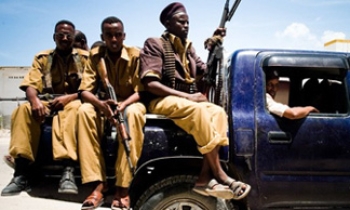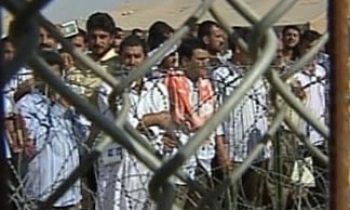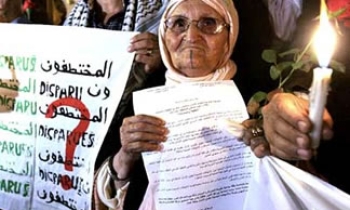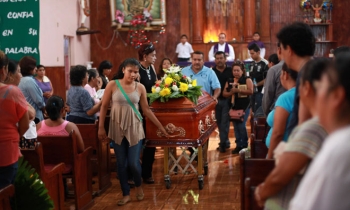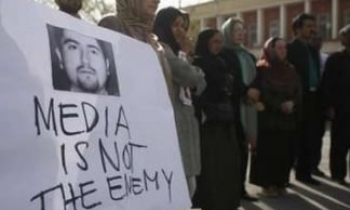BAGHDAD, Iraq, Aug. 9 — American marines have captured four Iraqi men suspected of playing a role in the kidnapping of an American journalist, Jill Carroll, in Baghdad in January, American military officials said Wednesday.
Maj. Gen. William B. Caldwell IV said the four men, whom he declined to identify, were arrested in the Sunni Arab-dominated region west of Baghdad. On Wednesday, an American spokesman referred reporters to an article about the captures of the men posted on a Web site that describes itself as the official Web site for the multinational force in Iraq, which says that three of the four were arrested by marines on May 19, during a sweep of a home they suspected of having been a safe house where Ms. Carroll was kept. It says that a fourth was arrested later. The Web site is www.mnf-iraq.com.
Ms. Carroll, who was at the time of her abduction a freelance reporter for The Christian Science Monitor, was abducted on Jan. 7 as she traveled to an interview with a Sunni Arab politician in western Baghdad. She was released on March 30, and during her captivity was apparently held in several houses in the Anbar Province and perhaps one in Baghdad.
Acting on details of her confinement that Ms. Carroll gave them after her release, marines searched four houses where military officials now believe she was held captive during her three-month ordeal, military officials said.
General Caldwell said one of four Iraqi suspects was a member of the Mujahedeen Shura Council, an umbrella group for several Sunni insurgent groups linked to Al Qaeda. The four were arrested in a series of home searches in Anbar Province, a region where several insurgent groups have battled American and Iraqi forces.
The series of home searches began with basic detective work by a young marine lieutenant from the Third Battalion, Fifth Marine Regiment, earlier this year, General Caldwell said. Perusing intelligence briefs and reports that described what Ms. Carroll told American officials about her surroundings during captivity, the marine noticed that the description of green metal window bars and a driveway gate matched those at a home outside the town of Habbaniya that marines had spotted in patrols, General Caldwell said.
The marines asked to search the house, he said, and found items inside, including a bookshelf in an upstairs bedroom, that matched descriptions Ms. Carroll had given of a home where she was held.
The marines arrested the home’s owner. Information he gave military interrogators led the marines to three other homes, in an eastward direction toward Baghdad, General Caldwell said. They arrested the Shura Council member after searching the second home, he said.
During a search of the third home, north of Abu Ghraib, several miles west of Baghdad, soldiers from the Fourth Infantry Division freed two hostages and arrested three more people. Information from those people led to the fourth house, on the west side of Baghdad, where officials now believe Ms. Carroll was also held during her detention, General Caldwell said.
It was unclear what the overlap was, if any, with the four men described by General Caldwell as having been arrested by the marines and the three arrested by the soldiers, or who the two other hostages were. It was also unclear why the military waited so long to announce the arrests.
He praised the marines who read the intelligence reports and matched details in them to those they noticed while on the streets of dangerous cities.
“Probably the best factual intelligence we’re going to find are those young marines on the streets” patrolling Anbar Province, the general said.
American officials who worked on finding and freeing Ms. Carroll earlier this year believed she was being held in Baghdad. Dan O’Shea, the former coordinator of the Hostage Working Group, which operates out of the American Embassy here, said Wednesday that he was not surprised to learn that Ms. Carroll might have also been held in homes in Anbar Province.
“Every time the individual is moved, they are being sold up the food chain to another group,” he said in a telephone interview from Tampa, Fla., on Wednesday. “A lot of the victims, without doubt, have been removed from Baghdad to the Falluja area.”
In November 2004, marines conducting a raid in Anbar Province found a 20-page “kidnapping manual,” he said, describing it as having been prepared by the Lebanese militia Hezbollah. “The insurgent rings are using kidnapping activities to fund themselves,” Mr. O’Shea said. “This is stuff they’ve learned.”
Three American soldiers with the Army’s First Brigade, First Armored Division died Wednesday in fighting in Anbar Province, the military said. This week has been particularly brutal for that brigade, which lost another soldier to enemy fire on Sunday.
On Tuesday, a Black Hawk helicopter from the Third Marine Aircraft Wing crashed in Anbar Province with soldiers on board during an “area familiarization” flight, the military said. The cause of the crash, which pitched the helicopter upside down into a body of water, was a mechanical problem, General Caldwell said Wednesday. Divers were still searching for two missing crew members, he said. The remaining four passengers and crew members were in stable condition, the military said.
In Baghdad on Wednesday, gunmen shot dead a fish vendor and four customers in a drive-by shooting near a gas station, an Interior Ministry official said. Six bodies were found on Wednesday in various areas in Baghdad, the official said.
Gunmen shot and killed a police officer in Falluja near his home on Wednesday afternoon, the police said. There was no immediately apparent motive for the killing of the officer, identified by the police as Hazim al-Janabi.
Ali Adeeb and Qais Mizher contributed reporting for this article.

